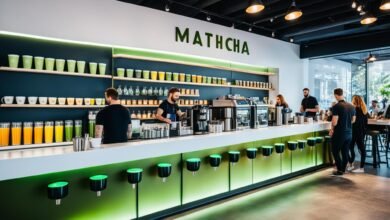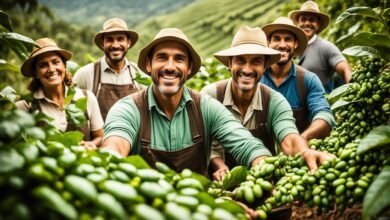Exploring the Thriving Specialty Coffee Industry
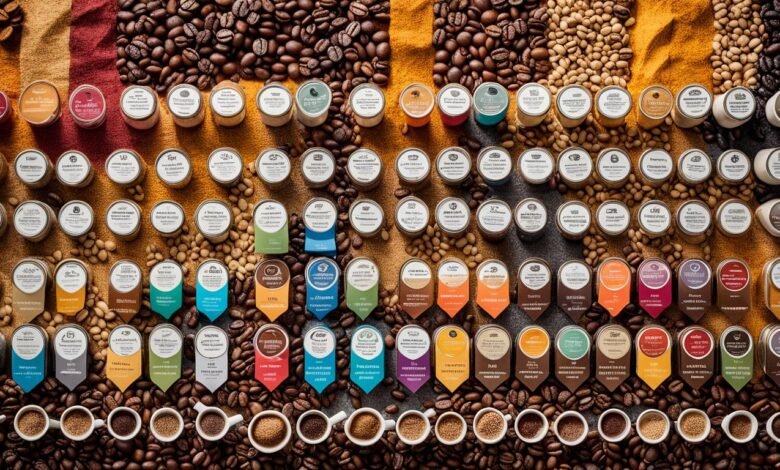
As I sip my morning latte, I’m amazed by how much the coffee industry has changed. No longer is a simple cup of coffee enough. Now, we’re in a world where finding the perfect brew is an art.
The specialty coffee market has grown a lot, reaching $21,916.2 million in 2022. It’s expected to grow even more, at 11.3% each year from 2023 to 2030. This growth is thanks to new tastes, a focus on being green, and millennials’ influence. Let’s explore the specialty coffee industry’s history, trends, and the people making it exciting.
Key Takeaways
- The global specialty coffee market size was estimated at USD 21,916.2 million in 2022 and is projected to grow at a CAGR of 11.3% from 2023 to 2030.
- Changing consumer preferences, a focus on sustainability, and the influence of millennials are driving the growth of the specialty coffee industry.
- The demand for specialty coffee has been fueled by the increasing number of coffee shops, the rise of ready-to-drink (RTD) specialty coffee, and the popularity of cold brew and nitro coffee.
- Coffee consumption in developing countries like China, India, and Brazil has been rising at a significant rate, contributing to the growing demand for specialty coffee.
- The thriving specialty coffee industry offers a wide range of options for consumers, catering to their evolving preferences and experiences.
Introduction to the Specialty Coffee Industry
Specialty coffee covers everything from farm to cup. It focuses on careful sourcing, roasting, and brewing of top-quality beans. Erna Knutsen introduced the term “specialty coffee” in 1974 for the best beans from specific areas. Today, the specialty coffee movement is big in the industry, changing what people like and expect.
Definition and History of Specialty Coffee
The Specialty Coffee Association (SCA) defines specialty coffee as beans scoring 80 or higher. These beans come from high altitudes, giving them unique tastes. In the last decade, more independent coffee shops and roasters have popped up, focusing on traceability and sustainability.
The Rise of Specialty Coffee Culture
Consumer tastes have changed, making specialty coffee more popular. Terms like “anaerobic fermentation” and “Geisha” appeal to those wanting unique coffee experiences. This shift has changed how coffee is sold and enjoyed, offering more ways to enjoy specialty coffee.
Now, specialty coffee is a big deal, attracting those who love quality and flavor. This has led to more independent coffee shops and roasters worldwide, changing how we enjoy coffee.
“The specialty coffee movement has evolved over time, becoming a dominant force in the recent wave of cafes blooming and thriving worldwide.”
| Key Specialty Coffee Industry Statistics | Value |
|---|---|
| Specialty coffee production involves a meticulous process | Only coffees free of defects and picked at their peak of ripeness continue to the next stages, ensuring high quality standards |
| Green coffee buyers play a crucial role | Often certified with SCA Coffee Skills Program, they assess coffee quality through cupping and communicate this information to roasters and café staff |
| Coffee roasters are certified by SCA | After completing extensive training, they apply scientific principles like heat transfer and coffee chemistry to ensure top-quality roast profiles for specialty beans |
| Baristas are also SCA certified | They are highly skilled in brewing operations and possess in-depth knowledge of coffee origins to bring out the full flavor potential of specialty beans |
| Consumers play a significant role | By actively seeking out and choosing high-quality specialty coffee options, they support a higher standard of living for everyone involved in the coffee value chain |
The specialty coffee industry has grown a lot, focusing on quality and sustainability. As consumers want better quality, the industry keeps improving, offering new experiences and pushing specialty coffee’s limits.
specialty coffee definition, specialty coffee origins, specialty coffee history, specialty coffee culture, coffee consumption trends, coffee consumer behavior
Market Overview and Trends
Global Specialty Coffee Market Size and Growth
The global specialty coffee market has seen strong growth lately. In 2022, it was worth USD 418,887.0 million. It’s expected to grow at a 4.8% CAGR from 2022 to 2028, reaching USD 555,103.78 million. This shows how the industry is adapting to new tech, focusing on sustainability, and changing what consumers want.
Emerging Trends Shaping the Industry
Several trends are changing the specialty coffee market. These trends are pushing innovation and changing how people drink coffee. They include:
- The growing popularity of ready-to-drink (RTD) specialty coffee, catering to the demand for convenient and on-the-go consumption.
- The rise of cold brew and nitro coffee, reflecting the increasing preference for unique and experimental coffee experiences.
- A heightened focus on sustainability and environmental responsibility, with consumers seeking out ethically sourced and eco-friendly coffee options.
- Technological advancements in brewing equipment and the use of data analytics to enhance the coffee experience.
- Shifts in consumer preferences, including a demand for personalized experiences and a focus on the provenance and quality of coffee.
These trends are influencing the specialty coffee industry. They’re leading to new products, marketing, and ways to connect with coffee lovers worldwide.
| Metric | Value |
|---|---|
| Global Specialty Coffee Market Size (2022) | USD 418,887.0 million |
| Global Specialty Coffee Market Growth (CAGR 2022-2028) | 4.8% |
| Global Specialty Coffee Market Size (2028 Forecast) | USD 555,103.78 million |
Key Players and Industry Dynamics
The specialty coffee industry is filled with a mix of big companies and local brands. These leaders are always finding new ways to stay ahead. They aim to meet the growing need for high-quality, artisanal coffee.
Major Specialty Coffee Companies and Brands
Some big names in specialty coffee stand out in the market:
- Starbucks: This global coffee chain has made specialty coffee popular around the world.
- Blue Bottle: Known for quality and sustainability, this California roaster and retailer is a favorite.
- Strauss Group: An Israeli company with brands like Café Landwer and Julius Meinl in its portfolio.
- J.M. Smucker: An American company with brands like Café Bustelo and Café Pilon.
- Gevalia: A Swedish brand known for premium coffee.
- Caribou Coffee: A chain from Minnesota that has grown across the U.S.
- Keurig Green Mountain: A leader in single-serve coffee brewers and pods.
- Lavazza: An Italian company known for quality and sustainability in coffee.
- Stumptown: A Portland roaster famous for its ethically sourced and expertly roasted coffee.
- Costa: A UK-based chain that has expanded worldwide.
- Bulletproof: Known for high-performance, carefully sourced coffee products.
These companies are always coming up with new ideas and making big moves. They do things like merge, buy other companies, and grow their capacity. This helps them stay ahead in the specialty coffee market.
Specialty Coffee Varieties and Origins
The specialty coffee world is full of different types and places of origin. Each one has its own special taste and flavor. From the famous Arabica and Robusta beans to new hybrids, specialty coffee is a journey for those who love coffee.
Popular Specialty Coffee Beans and Their Characteristics
Arabica and Robusta are top specialty coffee beans. Arabica makes up about 70% of the world’s coffee and is loved for its sweet taste and complex flavors. Robusta, on the other hand, has more caffeine and a stronger, earthier flavor.
There are also many cultivars and hybrids in specialty coffee. For example, Maragogype is a big cherry coffee with less yield. Bourbon Pointu/Laurina is small and has less caffeine.
| Coffee Variety | Characteristics |
|---|---|
| Arabica | Accounts for 70% of global production, known for sweetness, acidity, and complex flavors |
| Robusta | Higher caffeine content, more robust and earthy taste |
| Maragogype | Mutant of Typica, produces large cherries but with lower yield |
| Bourbon Pointu/Laurina | Natural mutation of Bourbon, exhibits dwarf stature and reduced caffeine content |
With so many specialty coffee types, each with its own unique taste, coffee lovers can find their favorites. This lets them enjoy a world of flavors and find what they like best.
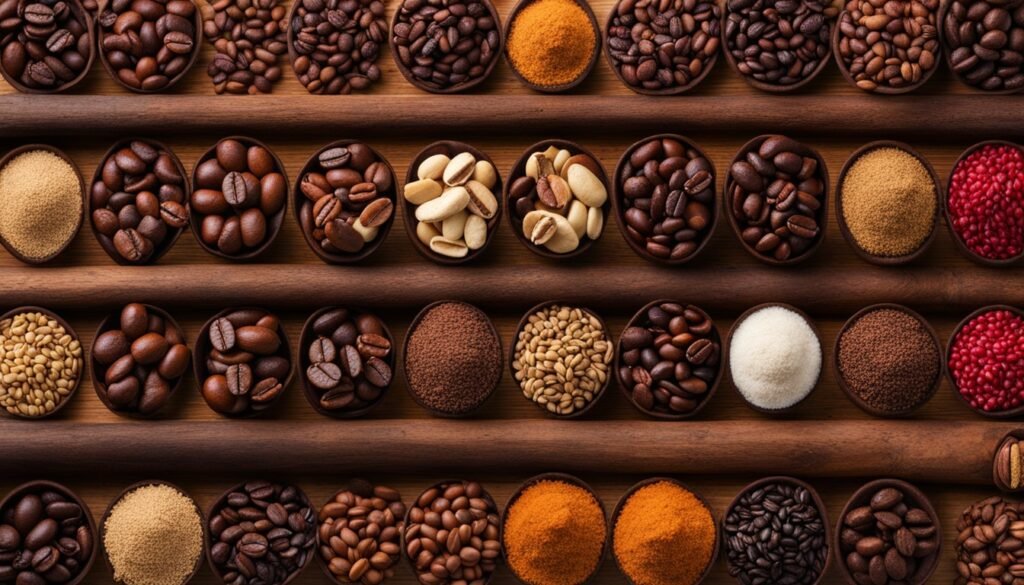
The Art of Specialty Coffee Roasting
At the core of the specialty coffee world is the art of roasting. This step is key to bringing out the unique tastes of green coffee beans. Roasters carefully control time, temperature, and airflow to make the perfect flavors. These flavors make the coffee experience special for those who love it.
Specialty coffee uses high-quality arabica beans from the best coffee regions. Regular coffee often uses lower-grade beans. Small-batch roasting is common in specialty coffee. It lets roasters control the roast for unique tastes.
This focus on detail shows off a wide range of flavors, like fruity, floral, chocolate, and spicy. This is different from regular coffee’s more uniform taste.
Craftsmanship is crucial in specialty coffee. Roasters and baristas work hard to improve their skills. Specialty coffee also supports sustainability and fair pay for farmers. This has a positive effect on the environment and coffee communities.
“The art of specialty coffee roasting is about unlocking the unique flavors and characteristics of each bean, creating a symphony of aromas and tastes that delight the senses.”
The specialty coffee industry is growing, making skilled roasters more important than ever. They use their knowledge of roasting to make the coffee experience better. This connects consumers with the wide range of flavors coffee offers.
Specialty Coffee Brewing Methods and Equipment
The specialty coffee industry has changed how we make and enjoy coffee. From the classic pour-over to the strong French press, and the intense espresso, there’s a lot to learn. Let’s look at these methods and the equipment needed for them.
Pour-Over, French Press, and Espresso Techniques
The pour-over method is popular for its precision and control. By pouring hot water over fresh beans, you get the best flavors. The French press lets coffee steep, making a full-bodied and aromatic drink. For a strong and rich drink, espresso is the choice, using high-pressure water to make a velvety elixir.
Specialty Coffee Brewing Equipment and Accessories
The specialty coffee world has brought us many tools and accessories. High-quality grinders, pour-over setups, and espresso machines are key for baristas and home coffee lovers. These tools help us make café-quality coffee at home.
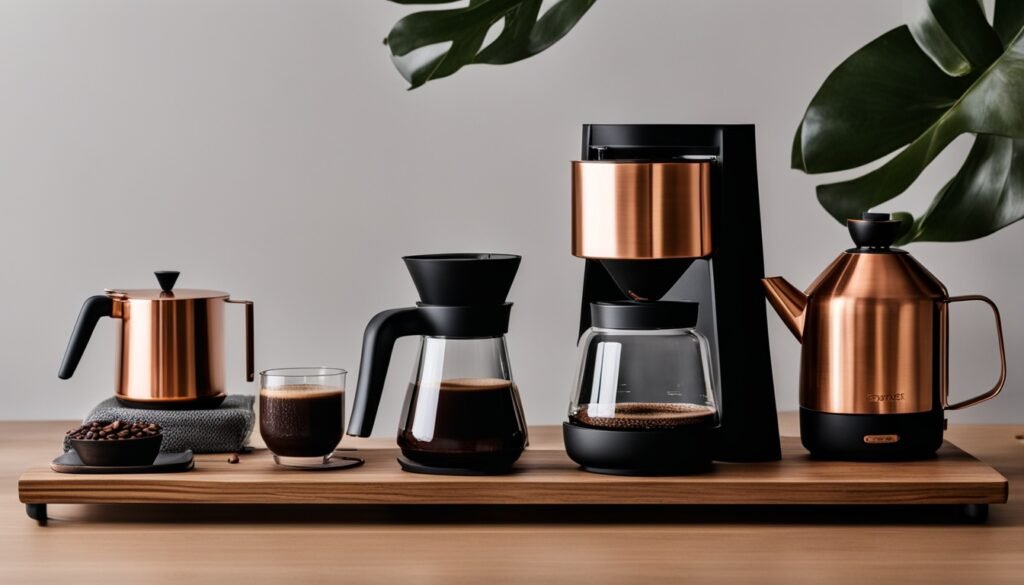
There’s a wide range of specialty coffee equipment, from the Aeropress to the Chemex. With these tools, we can bring out the best in our coffee beans. This makes our daily coffee routine a sensory delight.
| Brewing Method | Recommended Equipment | Brewing Time | Coffee-to-Water Ratio |
|---|---|---|---|
| Pour-Over | Hario V60 Dripper, Chemex | 2-4 minutes | 21 grams of coffee per 12 oz (350 mL) of water |
| French Press | French Press | 4 minutes + boiling time | 2 tablespoons (8 grams) of coffee per 5 oz (660 mL) of water |
| Espresso | Espresso Machine | 25-30 seconds | 18-21 grams of coffee |
Whether you’re an expert or just starting, specialty coffee brewing offers many options. Mastering these techniques and using the right equipment lets you enjoy your coffee beans fully. This can take your daily coffee to new levels.
The Specialty Coffee Industry
The specialty coffee industry is booming and always changing. It has seen a big increase in growth lately. The National Coffee Association says more people in the US are drinking specialty than ever before. Now, 43% of coffee lovers choose specialty coffee, which is a 20% jump since last year.
This rise in demand is because people want high-quality, unique coffee that cares for the planet. The industry has big companies and small ones competing in this growing market. Grand View Research expects the specialty coffee market to grow by 11.3% every year until 2030.
What makes the specialty coffee industry special? It’s the new tech, changing tastes, competition, and a push for sustainability. As it grows, it’s looking into new trends like ready-to-drink coffee and cold brew. It’s also working on solving problems like supply chain issues and economic ups and downs.
| Region | Market Share | Growth Projection |
|---|---|---|
| North America | 46.2% | 20% annual growth until 2030 |
| Europe | 46.2% | 9% growth by 2026 |
| Asia-Pacific | N/A | 15.3% annual growth until 2030 |
| Latin America | N/A | Slower growth compared to major origins like Brazil and Colombia |
| Africa | N/A | Significant potential for growth |
The specialty coffee industry is always changing. It’s moving forward with new tech, changing tastes, and a focus on being green. As it deals with these changes, it’s ready to grab new chances and tackle challenges. This will shape the future of coffee worldwide.
“Specialty coffee must obtain at least 80 points on the 100-point quality scale in the coffee industry, indicating its superior quality.”
Coffee Tasting and Quality Evaluation
In the specialty coffee world, we focus a lot on tasting and evaluating coffee quality. We use the Coffee Taster’s Flavor Wheel as a key tool. This tool helps us spot and describe the complex flavors, smells, and textures of various coffees.
The Coffee Taster’s Flavor Wheel guides us through the wide range of specialty coffee tastes. It ranges from fruity and floral to earthy and chocolatey. Knowing how to talk about coffee tasting helps us share the special traits of each coffee. It also helps us teach consumers and grow the specialty coffee culture.
Cupping and Sensory Evaluation Techniques
We also use cupping and sensory tests to check coffee quality. Cupping is a detailed tasting process. Experts look at the aroma, flavor, acidity, body, and balance of the coffee.
These cupping sessions show us what makes each coffee unique. They reveal the effects of where it comes from, how it’s made, and how it’s roasted. These strict tests help keep coffee quality high, encourage new ideas, and give consumers a great coffee experience.
| Cupping Score Range | Quality Descriptor |
|---|---|
| 80-100 | Excellent |
| 70-79 | Good |
| 60-69 | Average |
| 50-59 | Poor |
The Specialty Coffee Association (SCA) has a standard Cupping Sheet. It looks at Appearance, Aroma, Body, Flavor, Aftertaste, Acidity, Balance, Sweetness, and Overall, all scored from 0 to 10. Coffees scoring in the high 80s and low 90s are top quality. This shows the industry’s dedication to great coffee.

“Cupping is vital for sustaining quality control, consistency, sourcing, roast profiling, and education within the specialty coffee industry.”
Specialty Coffee Certifications and Standards
In the specialty coffee world, many certifications and standards have come to life. They aim to make sure coffee is grown in a sustainable way and that everyone gets a fair deal. These include Fair Trade, Organic, and Rainforest Alliance certifications.
These standards help coffee companies stand out and attract customers who care about ethics. They also help make the coffee industry better for everyone involved.
More and more coffee is now grown following these standards. In 2015, a quarter of all coffee was certified. This is a 63.3% increase from 2011.
| Certification | Certified Area (2015) | Certified Volume (2015) |
|---|---|---|
| 4C | 1.6 million hectares | 2.6 million tonnes |
| Fairtrade International | 1.3 million hectares | 560,000 tonnes |
| Organic | 800,000 hectares | 340,000 tonnes |
| Rainforest Alliance/SAN | 405,000 hectares | 520,000 tonnes |
| UTZ | 550,000 hectares | 821,000 tonnes |
Big names like Nestlé, Mondelez, and Starbucks buy a lot of certified specialty coffee. As certifications change, like with Sainsbury’s “Fairly Traded” label, the industry keeps focusing on coffee sustainability and ethical practices.
“Around 3% of the world’s coffee farmers are part of Fair Trade, and on average, certified coffee farmers can only sell around 35% of their beans on fair trade markets.”
The push for specialty coffee certifications shows the industry’s effort to help coffee producers and communities. By following these standards, companies are making a difference. They’re meeting the growing demand for coffee that’s both good for people and the planet.
Sustainability and Ethics in the Specialty Coffee Industry
The specialty coffee industry focuses on sustainability and ethics. Fair Trade and organic coffee certifications are key. They ensure coffee producers get a fair price and use eco-friendly farming.
Organic certification means no synthetic pesticides or fertilizers are used. This helps protect the environment and natural ecosystems.
These certifications help fix economic issues in the coffee world. They also support producers in the Global South. And they meet the demand for specialty coffee that is sustainably and ethically made.
There are more efforts to make the industry sustainable and ethical. These include using renewable energy, saving water, and cutting down on waste. Companies are also working with local communities to help with education, healthcare, and infrastructure.
Fair Trade and Organic Coffee Initiatives
Fair Trade and organic coffee are key to a better specialty coffee industry. Fair Trade makes sure producers get a fair price and use eco-friendly farming. Organic means no synthetic pesticides or fertilizers, protecting the environment.
Environmental and Social Responsibility Efforts
The industry is also working on being more responsible. It’s investing in renewable energy, saving water, and reducing waste. Companies are partnering with local groups to support social programs and improve life in coffee-growing areas.
This focus on the environment and people is making the specialty coffee industry better for everyone. It’s tackling economic issues and helping producers in the Global South. And it’s giving consumers what they want: sustainably sourced and ethically produced specialty coffee.
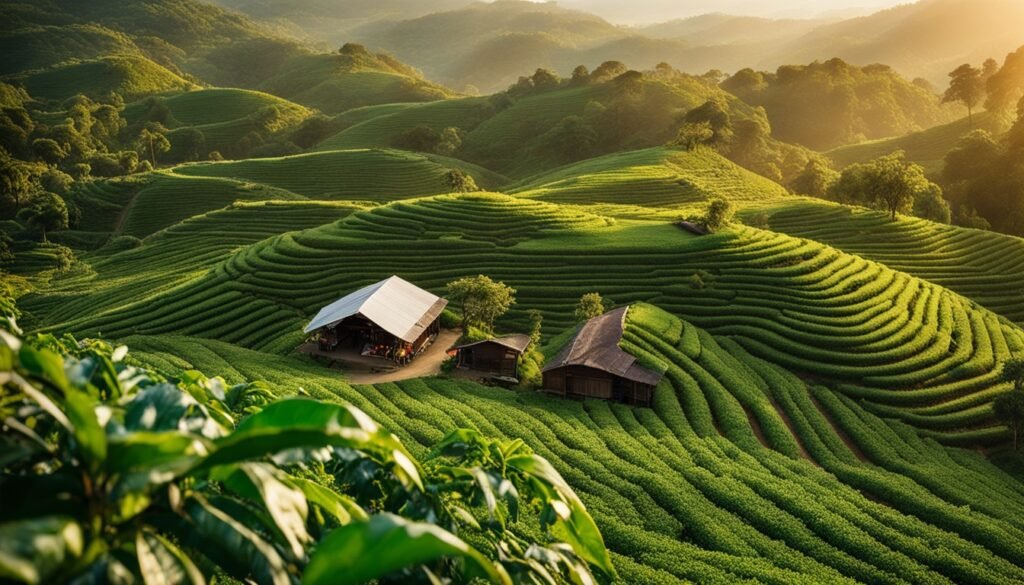
“Sustainability and ethical practices are at the heart of the specialty coffee industry, as we strive to create a more just and environmentally conscious future for all.”
The Future of Specialty Coffee
The specialty coffee industry is set to grow more, thanks to new markets and tech. Regions like Asia-Pacific, Latin America, and the Middle East are seeing more coffee lovers. This means more demand for high-quality, artisanal specialty coffee.
Emerging Markets and Growth Opportunities
Richer, more sophisticated countries are opening up new chances for specialty coffee. These places have a lot of potential as people look for premium coffee to match their tastes. The industry is also finding new ways to grow by offering things like ready-to-drink coffee and new brewing methods.
Technological Advancements and Innovations
Technology is changing the specialty coffee world for the better. It’s making roasting, supply chains, and brewing smarter and more efficient. This tech helps make coffee better, cheaper, and more personal for everyone.
As specialty coffee grows, it aims to make better coffee available to more people worldwide. It’s also focusing on being more sustainable and ethical.
“The specialty coffee movement continues to advocate for responsible sourcing practices, environmental sustainability, and quality over quantity.”
Conclusion
The specialty coffee industry has changed a lot, moving from a small market to a big global success. This change is thanks to new tastes, a push for sustainability, and the impact of millennials. Now, more people want high-quality, unique coffee than ever before.
Big companies and small ones are all trying to give customers what they want. They aim to offer special coffee experiences.
Looking ahead, we see the specialty coffee industry growing and changing more. New markets and tech will play big roles. We’ll also see more focus on being green and ethical, as customers want to know their coffee is made right.
This growth shows a big change in culture, where coffee means more than just a drink. It shows people care about quality and want unique experiences. As the industry keeps changing, we’ll see more new things in specialty coffee. These will meet the changing tastes and needs of coffee lovers everywhere.
